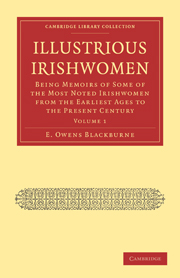 Illustrious Irishwomen
Illustrious Irishwomen INTRODUCTORY CHAPTER
Published online by Cambridge University Press: 07 September 2011
Summary
In the early history of every nation it will be found that mythologic legend is largely blended with plain matter-of-fact. This assertion is said to be especially applicable to early Irish history, although why such an invidious distinction should be made it is difficult to say; for the same thing holds good concerning the early history of Rome, of Greece, or, indeed, of any other antique nation. The story of Rhea Silvia, and that of Romulus and Remus and the wolf, which are so gravely recorded as historical facts, have no more claims to be believed than have the half-mythical, half-real stories whence the history of the ancient Irish must necessarily be compiled; and surely they have quite as good a right to pretend to historical accuracy as has the Iliad or the Odyssey. No one attempts to disprove the admixture of poetic fiction, bordering largely on the marvellous, which is interwoven with probabilities in these early romantic chronicles. At the same time, no person of ordinary reflection for a moment doubts but that these half legendary tales represent accurate historic facts and personages. Moreover, it will be admitted that, however obscure, and in many cases irreconcilable, these legends be in themselves, yet they represent these facts more truly and more clearly than can now be done by substituting in their stead any other hypothesis founded upon the so-called wisdom and experience of more recent times.
- Type
- Chapter
- Information
- Illustrious IrishwomenBeing Memoirs of Some of the Most Noted Irishwomen from the Earliest Ages to the Present Century, pp. 1 - 6Publisher: Cambridge University PressPrint publication year: 2010First published in: 1877


